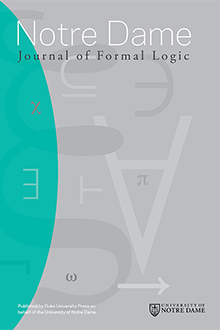Abstract
Disjoint -amalgamation is a condition on a complete first-order theory specifying that certain locally consistent families of types are also globally consistent. In this article, we show that if a countably categorical theory admits an expansion with disjoint -amalgamation for all , then is pseudofinite. All theories which admit an expansion with disjoint -amalgamation for all are simple, but the method can be extended, using filtrations of Fraïssé classes, to show that certain nonsimple theories are pseudofinite. As case studies, we examine two generic theories of equivalence relations, and , and show that both are pseudofinite. The theories and are not simple, but they have NSOP. This is established here for for the first time.
Citation
Alex Kruckman. "Disjoint -Amalgamation and Pseudofinite Countably Categorical Theories." Notre Dame J. Formal Logic 60 (1) 139 - 160, 2019. https://doi.org/10.1215/00294527-2018-0025
Information





